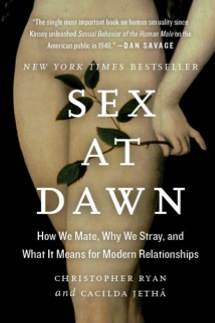Books |
Sex at Dawn: How We Mate, Why We Stray, and What It Means for Modern Relationships
Christopher Ryan and Cacilda Jethá
By
Published: Oct 09, 2012
Category:
Non Fiction
At some point, you may have been high enough or drunk enough or just clear enough to be struck by a radical insight: We don’t have to pray to go to Heaven, we’re living in it. There’s plenty here for all of us on this sparkling gem of a planet. No one has to go without food or medical care or decent shelter, no one has to live without love and — yes — its first cousin, sex.
Crazy talk, of course. I mean, just look at the headlines.
I’ll skip the banal question: Could we all get along?
Instead, let’s ponder one rarely asked: Was there ever a time when the mortal enemy of people was not… other people?
Christopher Ryan (PhD.) and Cacilda Jethá (MD) say there was.
And here’s the part that may especially interest you about that time: Monogamy didn’t exist.
Given that bombshell, it’s no surprise that “Sex at Dawn: How We Mate, Why We Stray, and What It Means for Modern Relationships” was a bestseller in hardcover and paperback, was on NPR’s book of the year list, and was described by Dan Savage as “the single most important book about human sexuality since Alfred Kinsey unleashed ‘Sexual Behavior in the Human Male’ on the American public in 1948.” [To buy the paperback from Amazon, click here. For the Kindle edition, click here.]
Their argument in brief: “We didn’t descend from apes. We are apes.”
“Monogamy is not found in any social, group-living primate…. The total number of monogamous primate species that live in large social groups is precisely zero. … The few monogamous primates that do exist (out of hundreds of species) all live in the treetops. Primates aside, only 3 percent of mammals and one in ten thousand invertebrate species can be considered sexually monogamous.”
“We evolved in intimate groups where almost everything was shared — even sexual pleasure … With and without love, a casual sexuality was the norm for our prehistoric ancestors.”
The change from group consciousness began when we stopped being hunter-gatherers and became farmers. Agriculture marked the birth of property, boundaries — and sexual exclusivity.
“Trying to rise above nature is always a risky, exhausting endeavor, often resulting in spectacular collapse…. Serial monogamy is an archipelago of failure.”
Stunning, yes? At least it was to this reader, a serial monogamist with multiple offenses. Maybe it’s best to watch Christopher Ryan utter these heresies:
These ideas are so dramatic that you plunge into the book expecting to have your hair burst into flames. This happens, but only randomly. There are entire chapters about chimps and bonobos and gorillas. There are long passages assassinating the work of monogamy-obsessed anthropologists. There are digressions that could have been edited out.
But if you skim the parts that don’t advance the core argument, “Sex at Dawn” is a thought-provoking romp. And it has terrific facts that were new — and, I’ll admit it — delightful to encounter:
— A male gorilla weighs 400 pounds. Its erect penis is an inch long.
— “Adult male humans have the longest, thickest, and most flexible penises of any living primate.”
— “Men last far longer in the saddle than bonobos (fifteen seconds), chimps (seven seconds) or gorillas (sixty seconds), clocking in at between four and seven minutes, on average.”
— Men who have three or more orgasms a week are 50% less likely to die from coronary heart disease.
— Cornflakes were originally devised as a masturbation deterrent.
— By 1917 there were more vibrators than toasters in American homes.
— Cornflakes were originally devised as a masturbation deterrent.
— From the time of Hippocrates until the 1920s, doctors masturbated their female patients to orgasm.
Reading this book — and seeing the 70 pages of notes and bibliography at the end — it’s hard not to surrender to the authors’ bottom line: “The assertion that human beings are naturally monogamous is not just a lie; it’s a lie most Western societies insist we keep telling each other.”
My view? I’m writing a novel about a couple grappling with this assertion; if you don’t mind, I’ll make you wait for its publication. Until then, I leave you to grapple with it — and, thanks to this book, collect some amazing facts you can trot out when the party gets dull.


